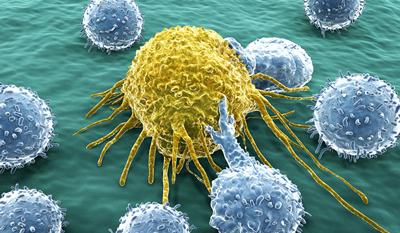New cancer drug shows promise in helping patients with blood cancer

A drug, which has been developed from the results of cancer immunology research at the University of Southampton, has been showed to reduce the risk of follicular lymphoma progression.
Results from the phase III GALLIUM study, being presented at the American Society of Hematology (ASH) congress, showed combining obinutuzumab (Gazyva) with chemotherapy in the first-line setting reduced the risk of disease progression or death by 34 per cent versus rituximab (Rituxan) plus chemotherapy in patients with follicular lymphoma.
Obinutuzumab was developed by Roche following immunology research from University of Southampton scientists spanning more than a decade.
Southampton researchers discovered that therapeutic antibodies against this cancer target, CD20 on lymphoma, could be divided into two types: type I which were already available to patients in the form of an approved drug, rituximab, and type II, which had not been tested in patients. Southampton research showed that a type II reagent, if it were made, might be a better reagent as it remained on the cancer cell longer. Roche developed the first therapeutic type II antibody, obinutuzumab, which has now been shown to be better than rituximab, the current form of treatment.
Professor Martin Glennie, a cancer immunology scientist at the University of Southampton, said: “Obinutuzumab seeks out the ‘CD20’ protein on the surface of malignant B-cells and flags its destruction by the body’s killer cells. Being a type II reagent gives the antibody an advantage as it remains at the cell surface longer than previously used antibody drugs.
“It has been an exciting and rewarding process to go from the discoveries in our laboratories all the way through to treating patients in clinical trials and working with them to understand exactly which types of lymphoma will respond best to which treatments. ”
The phase III GALLIUM study, which was led by Kings College Hospital, included 1401 treatment-naive patients with indolent non-Hodgkin lymphoma, of whom 1202 had follicular lymphoma. Patients were randomized to obinutuzumab plus chemotherapy, followed by obinutuzumab alone, or rituximab plus chemotherapy, followed by rituximab alone.
Results also showed that time to relapse extended by 32 per cent in patients receiving obinutuzumab plus chemotherapy compared to rituximab plus chemotherapy.
Peter Johnson, Professor of Medical Oncology at the University of Southampton added: “This new type of antibody treatment for lymphoma has been developed from immunology research in Southampton which started more than 10 years ago, when we started to find out how these antibodies work. We have much more to do in many different types of cancer, but this is a great example of how discovery science can work through into better treatments for our patients”
It is this detailed research to better understand new drugs and combinations with immunotherapy, that will be taking place in the University of Southampton’s new Centre for Cancer Immunology.
The Centre, which is being built at Southampton General Hospital and due to open in 2017, will be the first of its kind in the UK to focus exclusively on immunotherapy, a revolutionary new treatment that supercharges the body’s natural defences to find and destroy cancer. The Centre will bring together world-leading specialists and its aim is to accelerate research progress and conduct more clinical trials.